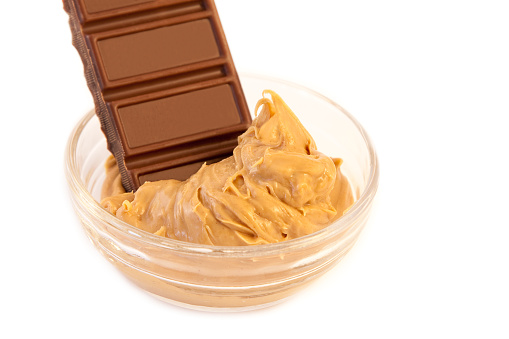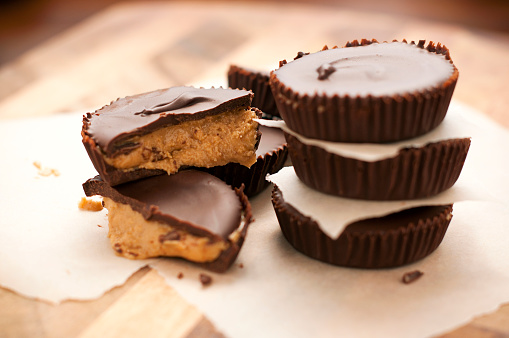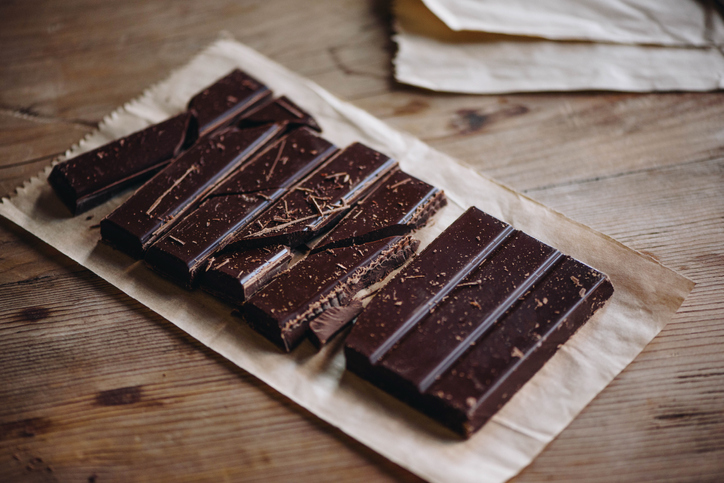Peanut Butter or Chocolate – Which Should You Avoid Before Bed?

Two guilty pleasures that also happen to have nutritional and health benefits are peanut butter and chocolate. Put them together and you have what some would consider the ultimate comfort treat.
How else can you explain the fact that peanut butter cups are one of the top-selling candies in the United States generating annual sales of over $2 billion? Or consider the tradition, which goes back to the 1950s, of hotels leaving a chocolate on your pillow as part of their turndown service.
So, it would be understandable if you told yourself that having one or the other – or even both together – as your bedtime snack is probably fine or perhaps even a good idea! After all, both may put a smile on your face before you drift off and that can’t be all that bad.
The truth, however, as with all things related to food and nutrition, is not quite that simple.
It turns out that one of them is a great idea for a bedtime snack while the other is best enjoyed earlier in the day. For the peanut butter lovers, the good news is that eating peanut butter before turning in for the night has a variety of health benefits. For the chocolate lovers, I’m sorry to say that it probably is not your ticket to a restful night of sleep and pleasant dreams.
Let’s look at each individually.

Peanut Butter
Advocates of enjoying a spoonful of peanut butter before bedtime like to highlight its nutritional value, especially its protein content (8g in two tablespoons). Consuming protein before sleep may support overnight muscle protein synthesis as well as giving a jumpstart to your morning metabolism. Protein also helps to curb hunger, so if you have some peanut butter at night, you may not wake up as hungry the next morning.
Peanut butter also contains the amino acid tryptophan, which may improve sleep quality. Other benefits include lowering your risk for developing type 2 diabetes and a decreased risk for heart disease because of peanut butter’s antioxidants.
In addition to protein, peanut butter is also a great source of the following:
- Niacin
- Antioxidants
- Potassium
- Magnesium
- Vitamin B6
- Fiber
- Polyunsaturated fatty acids
- Vitamin E
- Vitamin A
- Vitamin C
- Vitamin D
- Vitamin K
- Arginine
If you are going to combine your nighttime peanut butter with something to make a snack, stay away from nutrient void simple carbohydrates such as white bread. While this combo may bring back fond memories of your childhood, the white bread could cancel out the benefits of the peanut butter. You’re much better off enjoying a banana with the peanut butter (which is one of my favorites). The banana is equally packed with nutrients, some of which, specifically potassium and magnesium, are also known to promote relaxation.
Keep in mind that peanut butter is not a low-calorie food with two tablespoons packing a whopping 188 calories. So, enjoy, but do so in moderation.
I also recommend looking for the most natural peanut butter you can find – avoid added sugars or overly-processed spreads. If you are feeling a little adventurous, you can even make your own by just putting peanuts in a food processor for about five minutes. Very easy and quite fun!
Other nutrient-rich foods beside peanut butter that have been shown to help promote sleep include:
- Kiwi. According to various studies, kiwis may be one of the best foods to eat before bed. Over a 4-week study, 24 adults consumed two kiwifruits one hour before going to bed each night. At the end of the study, participants fell asleep 42% more quickly.
- Cherries. Few things are natural sources of melatonin, and cherries are one of them. It is considered the ‘sleep hormone’. Melatonin is said to help with sleep disorders and insomnia. Cherries are also packed with nutrients such as iron, potassium, and vitamins C and A.
- Bananas. Bananas seem to have everything you need contained in one peelable food. Not only do bananas have a healthy dose of magnesium, but they also contain tryptophan AND melatonin.
Chocolate

For its part, chocolate offers a variety of nutritional and health benefits. These include reducing stress, lowering cholesterol, promoting better cardiovascular health, and even possibly preventing cognitive decline. It also has a variety of vitamins and minerals, including:
- Iron
- Phosphorus
- Potassium
- Sodium
- Calcium
- Protein
- Vitamin C
- Vitamin D
- Vitamin B6
- Magnesium
And in the same way that peanut butter with the fewest additives provides the most health benefits, the same is true with chocolate. Always look for the purest chocolate with the least amount of added sugar.
But depending on the type, chocolate contains various amounts of two of the biggest enemies to a good night’s sleep – caffeine and sugar. The former can keep you awake and from getting enough deep sleep once you eventually do nod off. It also has theobromine, which while being great for reducing your risk for cardiovascular disease, can also keep you awake much in the same way caffeine can. The sugar can impact the amount of magnesium (which helps you relax) in your body which can impact sleep. It also causes a spike in your blood sugar which is then followed by a “sugar crash” which can cause you to wake up.
If provoking a bout with insomnia at bedtime weren’t enough, some studies also suggest that eating chocolate before bed can give you nightmares. The culprit is theorized to be the sugar in chocolate. This same sugar can also undercut your efforts at dental hygiene if you snack on chocolate before turning in.
Another reason to avoid chocolate late at night is that it may cause heartburn, which can interrupt or negatively impact the quality of your sleep.
Other foods you should avoid before going to sleep include cheese, ice cream, salty foods, spicy foods, acidic foods, alcohol (including wine and beer), and fatty foods. Of course, caffeinated beverages such as coffee and colas are out.
You should try to not eat any chocolate after around 4 or 5 pm to give your body time to metabolize its caffeine. Generally, it’s also a good idea to stop eating at least 2 hours before turning in for the night to give your food time to digest.
So, my advice is to remember that chocolate is best for the morning and afternoon while peanut butter is best for afternoon and evening. For more information and tips for getting a good night’s sleep, check out these pH blogs.
Enjoy your healthy life!
The pH professional health care team includes recognized experts from a variety of health care and related disciplines, including physicians, attorneys, nutritionists, nurses, and certified fitness instructors. This team also includes the members of the pH Medical Advisory Board, which constantly monitors all pH programs, products, and services. To learn more about the pH Medical Advisory Board, click here.



